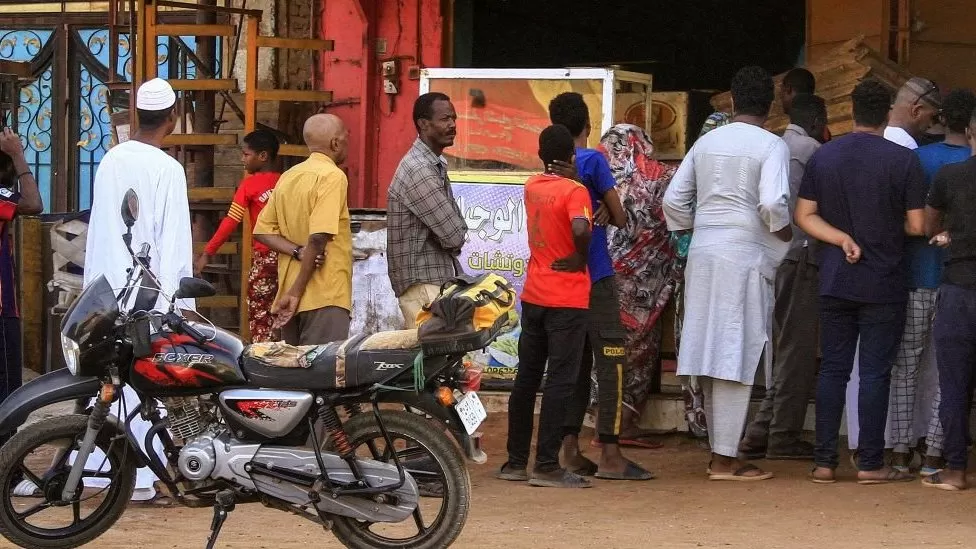Ongoing fighting in Sudan’s capital is now severely affecting food supplies, as well as disrupting access to water and electricity, according to Khartoum residents. “We only have enough food for two days,” Nisreen Al-Saim said.
Ms Saim added that, she and her family were now reducing the amount of food they consume in the hope that their supplies last longer. Water and electricity cuts have affected many Sudanese homes since clashes began between the Rapid Support Forces (RSF) paramilitary group and the Sudanese army on 15 April.

The two sides had been sharing power with the head of the army, Gen Abdel Fattah al-Burhan, as de facto leader and the head of the RSF, Mohamed Hamdan Dagalo as his deputy, but they have since started fighting each other. More than 270 people had died, according to a statement from the US embassy in Khartoum.
Shops Shut Down
In Bahri, Northern Khartoum, eyewitnesses are saying the main water pumping station had been badly damaged. Hind, a local resident, said the frequent water outages forced her and her family to rely solely on their reserves of Abri, a corn-based drink usually consumed during Ramadan, to quench their thirst.
Hind added that, all the shops in her neighbourhood had closed except for some bakeries, and even they had little flour left. A few days before the fighting started, the army had warned civilians to stockpile food following the deployment of RSF personnel to different points of the capital.
Heba, another resident in the capital, disclosed that, “only a few families” took the advice of the Army seriously, as no-one imagined that the situation would escalate to the current extent.
“We did not want to go out in the heat, as we had already stocked up on food for Ramadan,” Heba added.
U.N Suspends Humanitarian Aid
The United Nation’s mission in Sudan has suspended its aid, due to the intensity of the clashes. Neighborhoods are only getting power for two hours daily, meaning stored up food may spoil, if families do not get enough electricity to power their refrigerators, to store their food.
It is not clear for how long supplies will have to hold out, given that there’s no clear end to the clashes.
Moreover, two ceasefires announced couldn’t materialize, as fighting continued between the Sudanese Army and the Rapid Support Forces. Also, in some Khartoum neighbourhoods, fighting has slowed enough for grocery stores to reopen, there are queues and products like bottled water are scarce.

In other neighborhoods, residents are still afraid to step outside their homes, to get food supplies for themselves. Some shop owners in the Riyadh neighborhood, north of the capital, residents are complaining that, shop owners have increased their prices, sometimes charging up to twice the usual price for eggs, meat, and drinks.
“Some of them doubled their prices, which is awful, while others are giving some food for free to help people in need,” said Shakir, a Khartoum resident. “People are getting very angry about it,” shakir said. “We are all hoping this conflict will end soon but stocks are running low, and families should decrease their daily consumption if they want to survive this,” he added.

In further complicating matters, the UN’s World Food Program (WFP) announced the suspension of aid provision to Sudan, as a result of the demise of three of its staff in the Darfur region.
Earlier this year, the UN said that two-thirds of Sudan’s population (around 15.8 million people) already needed humanitarian aid in 2023. The situation made worse when countries decided to send aid to the country, following the 2021 military coup that ousted civilian Prime Minister Abdalla Hamdok.
In other developments, the Spokesperson for a political group known as the Forces for Freedom and Change, Abla Karrar, expressed her disgust at the UN’s decision to halt aid in wake of what she called a “critical situation.” “Sudan is already experiencing great economic hardship, and therefore the food stock in homes, no matter how large it is, will not be enough,” she disclosed in a statement.
Karrar also stressed on the need for a truce, before the country experiences a “deep humanitarian crisis.”
READ ALSO: Cattle Raiding Soars Higher In Mali



















